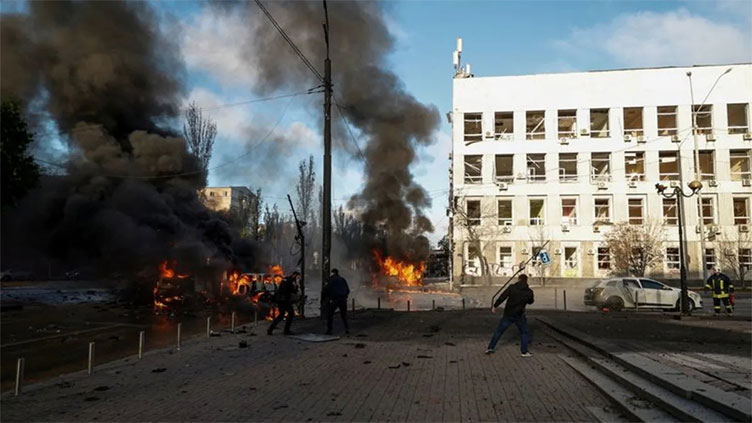Ukraine seeks more Western air defence help, NATO tightens security

World
Russian missiles again hit Ukrainian cities but with less intensity than on Monday.
KYIV (Reuters) - Ukrainian President Volodymyr Zelenskyy continued his appeals to leaders of the Group of Seven nations on Tuesday (Oct 11) for more air defence capabilities as the G7 vowed to support Kyiv for "as long as it takes".
NATO said it was closely monitoring Russia s nuclear forces following a string of Russian battlefield defeats in Ukraine and that the allies were also boosting security around key infrastructure after recent attacks on Baltic Sea gas pipelines.
Russian missiles again hit Ukrainian cities but with less intensity than on Monday, when dozens of strikes killed 19 people, wounded more than 100 and knocked out power across the country in Moscow s biggest aerial offensive since the start of its invasion on Feb 24.
More missile strikes killed at least one person in the southeastern Ukrainian town of Zaporizhzhia and left part of the western city of Lviv without power, local officials said. Air raid sirens earlier wailed across Ukraine for a second day.
"When Ukraine receives a sufficient quantity of modern and effective air defence systems, the key element of Russia’s terror, rocket strikes, will cease to work," Zelenskyy told G7 leaders at a virtual meeting where he again ruled out peace talks with Russian President Vladimir Putin.
Ukraine on Tuesday received the first of four IRIS-T air defence systems Germany promised to supply, a German defence ministry source said.
The White House later said the United States was speeding up the shipment of sophisticated NASAMS air defences to Ukraine. Washington has already provided more than US$16.8 billion worth of security aid to Ukraine during the war.
Zelenskyy s government has mixed gratitude for such aid with continued pleas for more powerful weapons and faster deliveries.
US Treasury Secretary Janet Yellen called on allies to swiftly disburse current commitments to Ukraine.
"UNCONTROLLED ESCALATION"
The G7 - which groups the United States, Germany, France, Japan, Britain, Italy and Canada - pledged continued "financial, humanitarian, military, diplomatic and legal support ... for as long as it takes" to Ukraine, it said in a statement.
It also condemned "indiscriminate attacks on innocent civilian populations" as war crimes and said Putin would be held to account for them.
Putin is a "rational actor who has miscalculated significantly", US President Joe Biden said in a CNN interview.
Moscow, which calls its actions in Ukraine a "special military operation" to eliminate dangerous nationalists and protect Russian speakers, has accused the West of escalating and prolonging the conflict by supporting Kyiv.
"We warn and hope that they realise the danger of uncontrolled escalation in Washington and other Western capitals," Russian Deputy Foreign Minister Sergei Ryabkov was quoted as saying by RIA news agency on Tuesday.
Kyiv and its Western backers accuse Russia of an unprovoked land grab in Ukraine.
Russian Foreign Minister Sergei Lavrov said that Moscow was open to talks with the West, a claim Washington dismissed as "posturing" because Russia has continued to strike Ukrainian cities.
In an interview on state television, Lavrov said Russia was willing to engage with the United States or with Turkey on ways to end the war, now in its eighth month, but had yet to receive any serious proposal to negotiate.
Putin, under domestic pressure to ramp up the war as his forces have lost ground since early September, said he ordered Monday s strikes as a response to a deadly explosion that damaged Russia s bridge to annexed Crimea last weekend.
Residents in the capital Kyiv took cover on Tuesday for a second day deep in the underground metro, where trains were still running.
Viktoriya Moshkivski, 35, and her family were among hundreds of people in the Zoloti Vorota station, near a park where a missile ripped a crater next to a playground on Monday.
"(Putin) thinks that if he scares the population, he can ask for concessions, but he is not scaring us. He is pissing us off," she said as her sons, Timur, 5, and Rinat, 3, sat by her side on a sleeping bag, the younger playing with an action figure.
MORE STRIKES
In recent weeks, Moscow has annexed new tracts of Ukraine, mobilised hundreds of thousands of Russians to fight and repeatedly threatened to use nuclear arms, stoking alarm in the West. A European diplomat said NATO was considering convening a virtual summit of the alliance to consider its response.
NATO has not noticed any change in Russia s nuclear posture following the threats, Secretary General Jens Stoltenberg told reporters in Brussels on Tuesday.
Stoltenberg also said NATO allies would meet any attacks on critical infrastructure with a "united and determined response."
It remains unclear who was behind explosions last month affecting Russian gas pipelines under the Baltic Sea. Moscow has denied any involvement and said the United States stands to benefit if it cannot transfer its gas to Europe.
The alliance will proceed with its annual nuclear preparedness exercise "Steadfast Noon" next week - in which NATO air forces practise the use of US nuclear bombs based in Europe with training flights - without live weapons.

